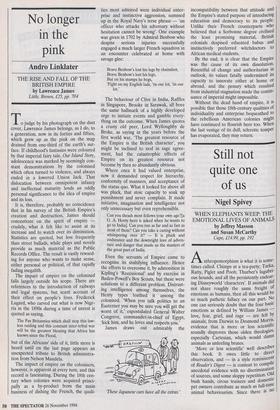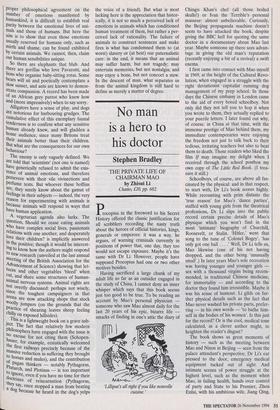Still not quite one of us
Nigel Spivey
WHEN ELEPHANTS WEEP: THE EMOTIONAL LIVES OF ANIMALS by Jeffrey Masson and Susan McCarthy Cape, £14.99, pp. 192 Anthropomorphism is what it is some- times called. Chimps at a tea-party; Tarka, Ratty, Piglet and Pooh; Thurber's lugubri- ous hounds, and all the persistently endear- ing Disneyworld 'characters'. If animals did not share roughly the same freight of emotions as humans, then all this would be so much pathetic fallacy on our part. NO one can seriously doubt that the four basic emotions as defined by William James — love, fear, grief, and rage — are felt by animals; from Darwin to Desmond Morris, evidence that is more or less scientific soundly disproves those olden theologies, especially Cartesian, which would damn animals as unfeeling brutes. 'More or less scientific' well describes this book. It owes little to direct observation, and — in a style reminiscent of Reader's Digest — is content to compile anecdotal evidence with no discrimination of sources, and some sloppy repetition. Old bush hands, circus trainers and domestic pet owners contribute as much as full-time animal behaviourists. Since there is n° proper philosophical agreement on the number of emotions manifested by humankind, it is difficult to establish real parity between the emotional lives of ani- mals and those of humans. But here the aim is to show that even those emotions usually reserved for humans only, such as mirth and shame, can be found exhibited by certain animals. We cannot, then, claim our human sensibilities unique. So there are elephants that blub. And there are gorillas who love Pavarotti, and lions who organise baby-sitting rotas. Some bears will sit and poetically contemplate a slow sunset, and ants are known to demon- strate compassion. A record has been made of an African grey parrot who knew how and (more impressively) when to say sorry. Alligators have a sense of play, and dogs are notorious for harbouring grudges. The cumulative effect of this exemplary faunal tenderness is to confirm what any sensitive human already knew, and will gladden a home audience, since many Britons treat their animals better than their children. But what are the consequences for our own behaviour?
The enemy is only vaguely defined. We are told that 'scientists' (not one is named) have generically refused to admit the exis- tence of animal emotions, and therefore persevere with their vile vivisections and perfume tests. But whoever these boffins they surely know about the gamut of feelings in their subjects — indeed, the very reason for experimenting with animals is because animals will respond in ways that have human application. A vegetarian agenda also lurks. The question, Should we cease eating animals who have complex social lives, passionate relations with one another, and desperately love their children? is implicitly answered in the positive; though it would be interest- ing to know how the authors might respond to new research (unveiled at the last annual meeting of the British Association for the Advancement of Science) showing that let- tuces and other vegetables 'bleed' when cut, and share some structures of human- animal nervous systems. Animal rights are not overtly discussed: perhaps not wisely, since the toughest campaigners in that arena are now attacking shops that stock woolly jumpers (on the grounds that the practice of shearing leaves sheep feeling chilly on exposed hillsides). This is a lightweight book on a grave sub- ject. The fact that relatively few modern Philosophers have engaged with the issue is no excuse for not citing them (Schopen- hauer, for example, ecstatically welcomed the first railways precisely because of the massive reduction in suffering they brought to horses and mules), and the contribution of pagan thinkers — notably Pythagoras, Plutarch, and Plotinus — is too important t9 ignore, even if you have no time for their doctrines of reincarnation (Pythagoras, they say, once stopped a man from beating a dog because he heard in the dog's yelps the voice of a friend). But what is most lacking here is the appreciation that histor- ically, it is not so much a perceived lack of emotions in animals which has conditioned human treatment of them, but rather a per- ceived lack of rationality. The failure of animals to construct sentences and make fires is what has condemned them to (at worst) slavery or (at best) our paternalistic care: in the end, it means that an animal may suffer harm, but not tragedy; may entertain memories, but not nostalgia; and may enjoy a bone, but not concoct a stew. In the descent of man, what separates us from the animal kingdom is still hard to define as merely a matter of degree.











































































 Previous page
Previous page